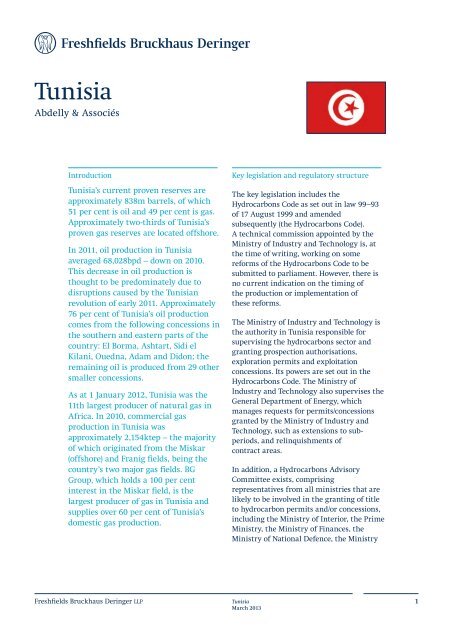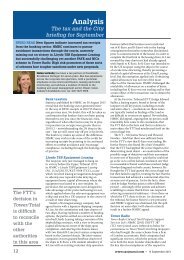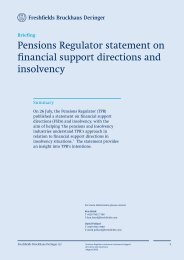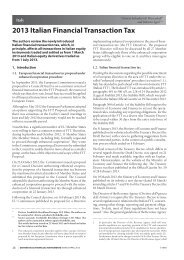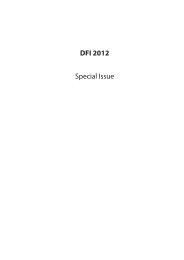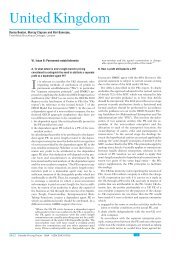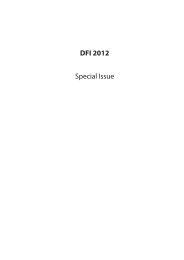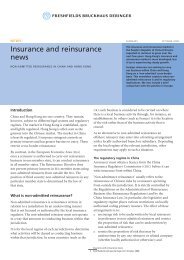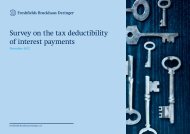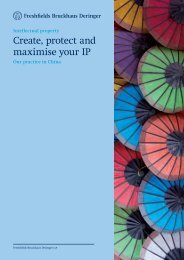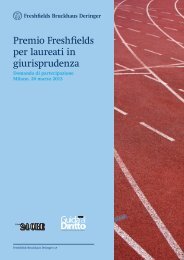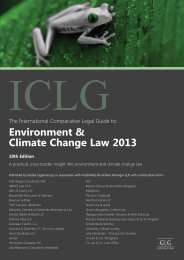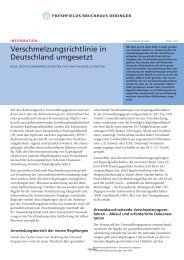Tunisia oil and gas report - Freshfields
Tunisia oil and gas report - Freshfields
Tunisia oil and gas report - Freshfields
You also want an ePaper? Increase the reach of your titles
YUMPU automatically turns print PDFs into web optimized ePapers that Google loves.
of Industry <strong>and</strong> Technology, <strong>and</strong> the CentralBank. The Ministry of Industry <strong>and</strong>Technology is required to seek advice fromthe Hydrocarbons Advisory Committeewhen granting a permit/concession <strong>and</strong>, ifrequired, for any other hydrocarbonrelatedmatters.National <strong>oil</strong> <strong>and</strong> <strong>gas</strong> companies are keyindustry participants in <strong>Tunisia</strong>. The mainnational entities are: Entreprise Tunisienned’Activités Pétrolières (ETAP), the stateownedcompany established by legislation in1972 that is responsible for the exploitation<strong>and</strong> trade of hydrocarbons; SociétéTunisienne d’Electricité et de Gaz (STEG), astate-owned entity that is the exclusivedistributor of <strong>gas</strong>; <strong>and</strong> Société Tunisiennedes Industries de Raffinage, a state-owned<strong>oil</strong> refinery that also trades refined <strong>oil</strong>.Licensing regimeThe licensing regime set out in theHydrocarbons Code covers four differenttypes of hydrocarbons rights. These includepreliminary authorisations for limitedseismic <strong>and</strong> drilling work <strong>and</strong> then grants ofrights to explore for develop <strong>and</strong> producehydrocarbons, each as described below.Contractors can either participate inexploration permits <strong>and</strong> concessionagreements directly as co-holders withETAP or, where ETAP is the party awardedthe permit or agreement, as contractorsengaged by ETAP under a productionsharing contract.• A prospecting authorisation is grantedby the Ministry of Industry <strong>and</strong>Technology for a period of one year to oneor more companies for the same area.This authorisation enables the holder(s) toperform preliminary prospecting workwithin the defined area, except forseismic works <strong>and</strong> drilling wells.• A prospecting permit is granted by theMinistry of Industry <strong>and</strong> Technology for aperiod of two years (which may beextended for a maximum of 12 months).This permit gives the holder(s) theexclusive right to perform prospectingwork within a defined area, except fordrilling activities that exceed 300 metersin depth <strong>and</strong> that are not intended solelyfor geological <strong>and</strong> seismic coring. Theholder of a prospecting permit has apriority right to have its prospectingpermit transformed into an explorationpermit if applied for at least two monthsbefore its expiry.• An exploration permit is granted by theMinistry of Industry <strong>and</strong> Technology foran initial period of up to five years <strong>and</strong>may be renewed twice for a period of fouryears each. A third renewal of a period offour years may be granted if the permitholder discovers <strong>oil</strong>. The holder of thepermit has the exclusive right to conductexploration activities within the definedblock <strong>and</strong> the exclusive right toobtain exploitation concessions withinthat block.To be granted an exploration permit, anapplicant must show the necessarytechnical <strong>and</strong> financial capabilities, have apresence in <strong>Tunisia</strong>, undertake toimplement an exploration workprogramme (specifying the nature <strong>and</strong> thesize of the work to be carried out with anestimate of the associated costs) <strong>and</strong> enterinto a Specific Agreement (ConventionParticulière) with the <strong>Tunisia</strong>n state asdrafted in accordance with a st<strong>and</strong>ardmodel approved by Decree No. 2001–1842dated 1 August 2001. This SpecificAgreement <strong>and</strong> its attachments must beapproved by Decree of the Ministry ofIndustry <strong>and</strong> Technology <strong>and</strong> published inthe Official Gazette of the Republic of <strong>Tunisia</strong>. Itsets out the terms <strong>and</strong> conditions of therelationship between the <strong>Tunisia</strong>n state,represented by the Ministry of Industry<strong>and</strong> Technology (referred to in the <strong>Tunisia</strong>n2 <strong>Freshfields</strong> Bruckhaus Deringer llp<strong>Tunisia</strong>March 2013
Hydrocarbon Code as the GrantingAuthority) <strong>and</strong> the permit holder duringthe exploration <strong>and</strong> exploitation concessionperiods.Under the <strong>Tunisia</strong>n Hydrocarbons Code,an exploration permit will not be grantedunless the applicant is acting inassociation with ETAP. Therefore, everycompany must agree to be associatedwith ETAP from the outset of explorationactivities. ETAP <strong>and</strong> its future associatesmust enter into a joint venture agreement(Contrat d’Association), setting out thenature of ETAP’s participation, <strong>and</strong> theterms <strong>and</strong> conditions that will apply to it.The Contrat d’Association <strong>and</strong> anyaddendum to it is subject to approval bythe Granting Authority.Under the ‘Association Regime’, theassociate of ETAP bears the cost <strong>and</strong> riskof carrying out the prospecting <strong>and</strong>exploration activities. However, in certaincases, ETAP may opt to contribute to thecost of such activities subject to approvalby the Granting Authority.Where exploration activities lead to acommercial discovery, the holder of avalid exploration permit may, under theterms of the Specific Agreement, applyfor an exploitation concession.• An exploitation concession may begranted by an order of the Minister ofIndustry <strong>and</strong> Technology, which must bepublished in the Official Gazette.ETAP has an option to acquire an interestin any exploitation concession, up to amaximum percentage interest, inprinciple 50 per cent, set out in therelevant Specific Agreement. If ETAPchooses to exercise its option to acquirean interest in the concession under theSpecific Agreement, it must reimburse itsassociate(s) for its share of the costsincurred up to the date of notification ofETAP’s participation.In addition to the Association Regimedescribed above, the Hydrocarbons Code alsoprovides for a production sharing agreement(PSA) as the basis for carrying out petroleumactivities. According to Article 97 of theHydrocarbons Code, ETAP in its capacity asholder of an exploration permit can enterinto a PSA with a company (or group ofcompanies) that will act as ‘contractor’. Incase of a commercial discovery, ETAP asholder of the exploration permit will thenbe awarded an exploitation concession.Under the ‘PSA Regime’, the contractorcarries out the exploration <strong>and</strong> exploitationactivities <strong>and</strong> bears all costs <strong>and</strong> risks onbehalf of <strong>and</strong> under the control of ETAP.National <strong>oil</strong> company/state participationAs indicated above, under the HydrocarbonsCode, an exploration permit will not begranted unless the applicant is acting inassociation with ETAP or as a contractorunder the PSA Regime. Under theAssociation Regime, ETAP has an option toacquire a participation in any exploitationconcession granted as a result of acommercial discovery under an explorationpermit. Under the PSA Regime, ETAPhas an entitlement to a share ofhydrocarbon production.Fiscal regimeThe fiscal regime applicable to E&Pcompanies operating in <strong>Tunisia</strong> is governedin particular by the Hydrocarbons Code.Taxes applicable to the upstream <strong>oil</strong> <strong>and</strong> <strong>gas</strong>sector are set out below.• Registration fee – payment of a fixed feefor the registration of the SpecificAgreements, Contrats d’Association, PSAs,<strong>and</strong> any related agreements (20 TND perpage, approx $13).• Royalty (Article 101.2.1 of the <strong>Tunisia</strong>nHydrocarbons Code) – a royaltyproportional to the quantity ofhydrocarbons produced by the holder ofan exploitation concession is payable<strong>Freshfields</strong> Bruckhaus Deringer llp<strong>Tunisia</strong>March 20133
either in kind or in cash to the GrantingAuthority in accordance with the terms ofthe Specific Agreement. The method ofcalculating the royalty payable is based onthe ‘R’ ratio (see Petroleum Income Taxbelow). The royalty rate is divided intoseven tiers for <strong>oil</strong> <strong>and</strong> nine tiers for <strong>gas</strong>,which range from 2 per cent to 15 per centdepending on the R value determined.• Petroleum Income Tax (Article 101.3 ofthe <strong>Tunisia</strong>n Hydrocarbons Code) – tax ispayable on net income from <strong>oil</strong> <strong>and</strong> <strong>gas</strong>produced based on the ratio of accruednet earnings to accrued totalexpenditures for each exploitationconcession (the R ratio). Net income from<strong>oil</strong> is taxed at a rate of 50–75 per cent.Net income from <strong>gas</strong> is taxed at a rate of50–65 per cent. A 50 per cent tax rateapplies to both <strong>oil</strong> <strong>and</strong> <strong>gas</strong> if ETAP hastaken a stake of 40 per cent or more inthe relevant concession.• Petroleum Annual Tax (Article 101.1.2 ofthe <strong>Tunisia</strong>n Hydrocarbons Code) – this isa fixed annual tax for every hectare ofl<strong>and</strong> included in an exploitation concessionequal to the hourly minimum wage of anordinary worker (ie $1/hectare). This tax isequal to five times the hourly minimumwage of an ordinary worker per hectarefor inactive or non-exploited concessions.This tax is payable annually (30 June)during the entire term of a concession.• Fixed tax (Article 101.1.1<strong>Tunisia</strong>nHydrocarbons Code) – this tax is equal tothe hourly minimum wage of an ordinaryworker for every full elementaryperimeter (an area of 4km2) to which anexploration permit, prospecting permit orexploitation concession has been granted.This tax amounts to approximately$195 per perimeter <strong>and</strong> does not apply toprospecting authorisations. This tax is aone-off payment that must be paidwhenever a new permit/concession isgranted, an existing permit/concession isrenewed or the area for prospecting/exploring/exploiting is extended.In addition, under the PSA Regime:• a fixed percentage of production (cost <strong>oil</strong>)is allocated to the contractor for therecovery of costs incurred under the PSA(including, where relevant, costs incurredunder a prospecting permit). Thepercentage is specified in the PSA <strong>and</strong> is50 per cent for <strong>oil</strong> <strong>and</strong> 55 per cent for <strong>gas</strong>;• the remaining production (profit <strong>oil</strong>) isshared between ETAP <strong>and</strong> the contractoraccording to the terms of the PSA <strong>and</strong> theSpecific Agreement based on the R ratio:—— for <strong>oil</strong>, the split varies from 65–85 percent for ETAP <strong>and</strong> 35–15 per cent forthe contractor;—— for <strong>gas</strong>, this split varies from 55–75per cent for ETAP against 45–25 percent for the contractor; <strong>and</strong>• ETAP (as owner of the petroleum assets) isheld liable for the payment of theregistration fee, royalty, petroleumannual tax <strong>and</strong> the fixed tax. Thecontractor is liable for the PetroleumIncome Tax, but this is deemed to havebeen paid when the contractor deliversETAP its profit <strong>oil</strong> share. The contractorremains otherwise subject to the generaltax regime applicable to entitiesoperating in <strong>Tunisia</strong>.Local content requirementsThe <strong>Tunisia</strong>n Hydrocarbons Code has localcontent requirements specifically set out inArticle 62.2. Under the Code, the permitholder or contractor must hire, as a matterof priority, <strong>Tunisia</strong>n employees, as long asthis is compatible with the properaccomplishment of its activities.The permit holder or contractor must alsotrain the <strong>Tunisia</strong>n personnel in allspecialisms as required by his activities, inaccordance with a training plan that issubject to Granting Authority approval.4 <strong>Freshfields</strong> Bruckhaus Deringer llp<strong>Tunisia</strong>March 2013
For comparable prices, qualities <strong>and</strong> deliverytimes for the same product or service, thepermit holder or contractor must use, as amatter of priority, materials <strong>and</strong> equipmentmade in <strong>Tunisia</strong> or <strong>Tunisia</strong>n servicecompanies <strong>and</strong> subcontractors.Transfer of interestsConsentsThe <strong>Tunisia</strong>n Hydrocarbons Code permitsthe total or partial transfer of upstream <strong>oil</strong><strong>and</strong> <strong>gas</strong> interests if the following conditionsare satisfied:• the transaction is subject to a transferagreement (contrat de cession) concludedunder <strong>Tunisia</strong>n law <strong>and</strong> approved by theMinistry of Industry <strong>and</strong> Technology withthe assent of the Hydrocarbons AdvisoryCommittee; <strong>and</strong>• the transferee continues to fulfil theconditions under which the concession orpermit was awarded.A transfer of interests, rights <strong>and</strong> obligationsin respect of a petroleum asset is subject toan order of the Ministry of Industry <strong>and</strong>Technology, which is to be published in theOfficial Gazette.If a change in the share capital structure ofthe permit holder or contractor leads to achange of control, the transaction requiresthe approval of the Hydrocarbons AdvisoryCommittee but is not subject to an order ofthe Ministry of Industry <strong>and</strong> Technology<strong>and</strong> need not be published in the OfficialGazette. The Hydrocarbons AdvisoryCommittee’s main concern is to ascertainthe financial capabilities of the new parentcompany <strong>and</strong> it may make its approvalsubject to the provision of a bank guarantee.If a change in the share capital structuredoes not lead to any change of control, thetransaction is subject only to a notificationletter to be addressed to theGranting Authority.TaxationAccording to Article 105 paragraph 2 of theHydrocarbons Code, any assignment ofrights, interests <strong>and</strong> obligations under aprospecting permit, exploration permit orexploitation concession under theHydrocarbons Code will not be subject toany tax either existing or to be institutedlater on under the common tax regime.Transfers made between affiliatedcompanies must be notified to the GrantingAuthority. The Granting Authority mayrequire the transferee company (or itsparent company) to commit to fulfilling theconditions under which the permit wasawarded by providing a parent companyguarantee or other form of security.<strong>Freshfields</strong> Bruckhaus Deringer llp<strong>Tunisia</strong>March 20135
Stabilisation/equilibrium <strong>and</strong>dispute resolutionThe taxes, levies <strong>and</strong> duties for which E&Pcompanies are liable are fixed exhaustively,along with the other associated obligations,in the Hydrocarbons Code (Article 100 <strong>and</strong>following). The principle of stability isfurther ensured by the Specific Agreementsentered into between the E&P companies<strong>and</strong> the <strong>Tunisia</strong>n state, in which the<strong>Tunisia</strong>n state guarantees the legalframework <strong>and</strong> commits never to submit thepermit holder or contractor, whetherdirectly or indirectly, to a legal regime thatis more restrictive than that governed by theSpecific Agreement <strong>and</strong> its attachments.The parties to a Specific Agreement, Contratd’Association <strong>and</strong> PSA are free to choose theirdispute resolution mechanisms, except thatthe applicable law <strong>and</strong> regulations must bethat of <strong>Tunisia</strong>. In practice, most of thoseagreements stipulate that:• any dispute between the parties shall besubject to arbitration in accordance withthe rules <strong>and</strong> procedures of theInternational Chamber of Commerce inforce at the date of the start of arbitrationproceedings;• the seat of the arbitration is to be Paris,France; <strong>and</strong>• the language of the arbitration is tobe French.freshfields.com<strong>Freshfields</strong> Bruckhaus Deringer llp is a limited liability partnership registered in Engl<strong>and</strong> <strong>and</strong> Wales with registered number OC334789. It is authorised <strong>and</strong> regulated by the Solicitors RegulationAuthority. For regulatory information please refer to www.freshfields.com/support/legalnotice. Any reference to a partner means a member, or a consultant or employee with equivalent st<strong>and</strong>ing <strong>and</strong>qualifications, of <strong>Freshfields</strong> Bruckhaus Deringer llp or any of its affiliated firms or entities. This material is for general information only <strong>and</strong> is not intended to provide legal advice.© <strong>Freshfields</strong> Bruckhaus Deringer llp, March 2013, 35653


